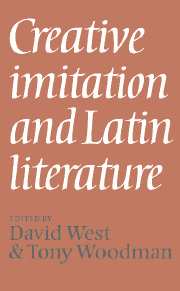Book contents
- Frontmatter
- Contents
- CONTRIBUTORS
- Prologue
- 1 DE IMITATIONE
- 2 PLAVTVS VORTIT BARB ARE: Plautus, Bacchides 526–61 and Menander, Dis exapaton 102–12
- 3 FROM POLYPHEMUS TO CORYDON: Virgil, Eclogue 2 and the Idylls of Theocritus
- 4 TWO PLAGUES: Virgil, Georgics 3.478–566 and Lucretius 6.1090–1286
- 5 HORATIAN IMITATIO AND ODES 2.5
- 6 IVDICIVM TRANSFERENDI: Virgil, Aeneid 2.469–505 and its antecedents
- 7 SELF-IMITATION WITHIN A GENERIC FRAMEWORK: Ovid, Amores 2.9 and 3.11 and the renuntiatio amoris
- 8 SELF-IMITATION AND THE SUBSTANCE OF HISTORY: Tacitus, Annals 1.61–5 and Histories 2.70, 5.14–15
- 9 LENTE CVRRITE, NOCTIS EQVI: Chaucer, Troilus and Criseyde 3.1422–70, Donne, The Sun Rising and Ovid, Amores 1.13
- 10 PYRAMUS AND THISBE IN SHAKESPEARE AND OVID: A Midsummer Night's Dream and Metamorphoses 4.1–166
- 11 EPILOGUE
- Notes
- Abbreviations and bibliography
- Select indexes
2 - PLAVTVS VORTIT BARB ARE: Plautus, Bacchides 526–61 and Menander, Dis exapaton 102–12
Published online by Cambridge University Press: 12 March 2010
- Frontmatter
- Contents
- CONTRIBUTORS
- Prologue
- 1 DE IMITATIONE
- 2 PLAVTVS VORTIT BARB ARE: Plautus, Bacchides 526–61 and Menander, Dis exapaton 102–12
- 3 FROM POLYPHEMUS TO CORYDON: Virgil, Eclogue 2 and the Idylls of Theocritus
- 4 TWO PLAGUES: Virgil, Georgics 3.478–566 and Lucretius 6.1090–1286
- 5 HORATIAN IMITATIO AND ODES 2.5
- 6 IVDICIVM TRANSFERENDI: Virgil, Aeneid 2.469–505 and its antecedents
- 7 SELF-IMITATION WITHIN A GENERIC FRAMEWORK: Ovid, Amores 2.9 and 3.11 and the renuntiatio amoris
- 8 SELF-IMITATION AND THE SUBSTANCE OF HISTORY: Tacitus, Annals 1.61–5 and Histories 2.70, 5.14–15
- 9 LENTE CVRRITE, NOCTIS EQVI: Chaucer, Troilus and Criseyde 3.1422–70, Donne, The Sun Rising and Ovid, Amores 1.13
- 10 PYRAMUS AND THISBE IN SHAKESPEARE AND OVID: A Midsummer Night's Dream and Metamorphoses 4.1–166
- 11 EPILOGUE
- Notes
- Abbreviations and bibliography
- Select indexes
Summary
Latin literature began in 240 B.C. with the adaptation of a Greek play and for a long time drama was to be the predominant literary genre at Rome. For the most part this drama consisted of versions of Greek classics: in tragedy the fifth-century repertoire and particularly Euripides, in comedy the plays of the ‘New Comedy’, those of Menander and his contemporaries. It happens that much the best preserved part of early Latin literature is comedy, twenty plays of Plautus and six of Terence. This corpus has long been a subject of keen inquiry by historians of literature and literary critics, their purpose being to discover the method of composition of the Roman dramatists. The central problem has been to assess their degree of fidelity to their Greek models or, to put it another way, to determine their originality.
For long such an inquiry was gravely handicapped for lack of evidence. In the case of Terence there existed a modicum of useable material, some internal and external testimony as to his compositional activity. He himself made statements about the composition of his plays in his prologues. The commentary on his plays which goes under the name of Donatus occasionally notes where Terence diverges from his original and sometimes (but only with tantalizing infrequency) actually quotes what was in the Greek play. For Terence's predecessor Plautus, however, evidence was much scarcer, a few fragments of Greek plays which were with varying degrees of probability supposed to correspond to passages in his plays and one passage in a prologue which apparently states that Plautus has made a cut in his original (Plautus, Casina 64ff.).
- Type
- Chapter
- Information
- Creative Imitation and Latin Literature , pp. 17 - 34Publisher: Cambridge University PressPrint publication year: 1979
- 13
- Cited by



